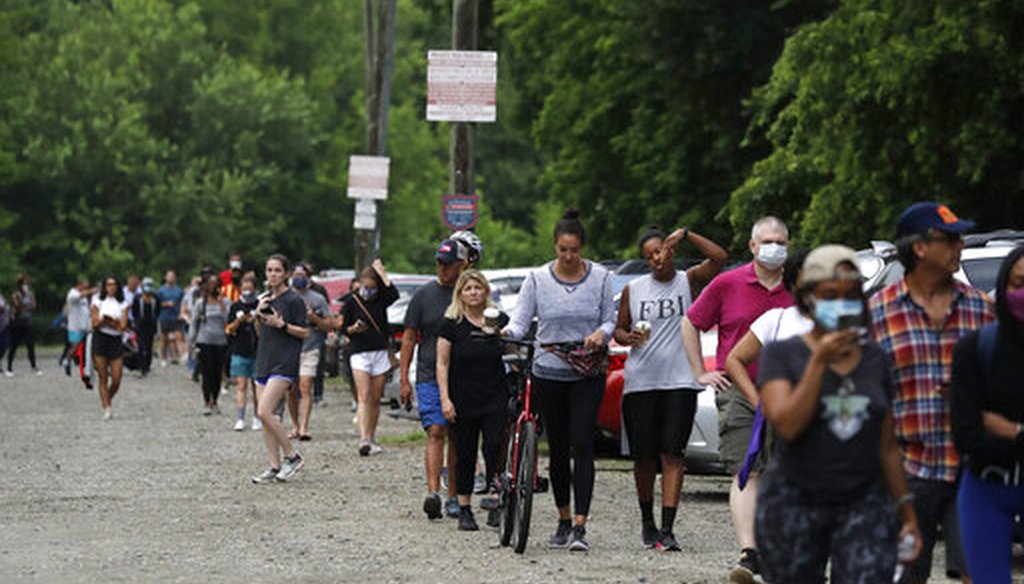Stand up for the facts!
Our only agenda is to publish the truth so you can be an informed participant in democracy.
We need your help.
I would like to contribute

People wait in line to vote in the Georgia's primary election at Park Tavern on Tuesday, June 9, 2020, in Atlanta. (AP)
If Your Time is short
-
More than 1.1 million Georgia voters cast their primary ballot by mail, a big increase from previous elections.
-
Georgia poll workers were using new equipment for the first time during the June 9 primary.
-
The date of the primary was moved twice. Many of the poll workers lacked in-person training on equipment.
The headline in the Atlanta Journal-Constitution summed up Georgia’s June 9 primary in two words: "Complete meltdown."
Some waited in line for hours to vote. County officials were swamped with mail-in ballots. Poll workers struggled to use new equipment. Some counties had fewer polling locations than originally planned or had to relocate polling locations. When it was over, state and county officials pointed the finger at each other, lawmakers launched investigations and Democrats sued state and county election officials.
Nationally, election officials have faced the unprecedented challenges of handling increased voting by mail and creating COVID-safe in-person voting sites this year. In Wisconsin, a masked voter in line to vote held up a sign saying "This is ridiculous," and became a national symbol of the pandemic-year voting chaos.
But Georgia’s struggles were particularly glaring, and they serve as an omen of what could go wrong on Nov. 3. The combination of new equipment, enthusiastic turnout, COVID-19 risks at polling sites, and insufficient poll workers that marred Georgia’s primary could recur in November.
Voter access in Georgia has drawn national attention because of the state’s changing demographics. Democrat Stacey Abrams’ narrow loss in the 2018 governor’s race shows that the state could be in play for Democrats this year including in two competitive U.S. Senate races. Any election problems draw scrutiny in Georgia, a state that has faced criticism for years about how policies such as voter-list purges, polling closures or long lines affect voters, especially Black voters.
Sign up for PolitiFact texts
Here we will look back at what went wrong in the primary and what changes are underway for the Nov. 3 election.
RELATED: Voting Counts: How Kentucky’s June primary election turned out
Significant increase in voting by mail
Georgia’s June 9 election shattered records for primary turnout with more than 2.2 million ballots cast. Around one-third of voters cast ballots.
Total turnout, absentee ballots, and early voting all set records, according to the Secretary of State’s office.
Republican Secretary of State Brad Raffensperger announced in March that he was sending absentee ballot request forms to all voters for the primary. The vast majority of Georgia voters had voted in person in the past — only about 5% voted by mail in the 2016 and 2018 general elections.
Local election officials weren’t prepared for the mail onslaught.
More than 1.1 million ballots were cast absentee — compared with about 37,000 during the 2016 general primary. The June 9 absentee-vote numbers were about a five-fold increase from the November 2016 election.
Some voters said they didn’t get their absentee ballot on time and headed to vote in person; that contributed to the lines. About two weeks before the primary, Fulton County election officials were scrambling to tackle a backlog of about 25,000 ballot applications.
Multiple problems led to lines at many polling sites
Election workers had little time to familiarize themselves with new equipment. Georgia awarded a $100 million contract to Dominion Voting Systems for new equipment in the summer of 2019 after the state had been criticized for using a system that lacked a secure paper trail. A federal judge described Georgia’s previous equipment as "antiquated" and "seriously flawed."
Many poll workers didn’t receive in-person training on how to use the new electronic poll book, touchscreens, printer and scanner.
"There was nothing that was the same. It was completely new," Janine Eveler, director of elections for Cobb County in suburban Atlanta, told PolitiFact.
Cobb County trained poll workers in February ahead of what was supposed to be a March primary. But then the primary was postponed twice.
By primary day June 9, there were few workers available who had taken the February training. Some watched videos, but that wasn’t the same as hands-on training.
Many counties struggled with either setting up or using the new equipment. Gwinnett County northeast of Atlanta changed the way it delivered and set up equipment for the primary, resulting in delays. On primary day, 16 of 156 polling locations opened without all of the equipment, although voters were given an emergency paper ballot. The 16 affected precincts were set up and voting normally by 10 a.m. The county is changing procedures to deliver the equipment for the Nov. 3 election.
On Election Day, Raffensperger cast blame on a couple of large, predominantly liberal counties.
"When these things arise — and it’s really specifically in one or two counties, in Fulton and DeKalb counties, that had these issues today — it leads us back to the failure of the management of the county election directors," Raffensperger told the AP. "It has nothing to do with what we’re doing in the rest of Georgia."
Fulton County, which includes Atlanta, was widely considered a disaster with long lines. Hundreds of poll workers backed out, and the county rushed to hire more days before the election. The county also had fewer early-voting sites and precincts than it would normally have had.
County officials said they had other setbacks. A staffer died from COVID-19, and the office was closed for days to be sanitized and a registration official was hospitalized. A Georgia state elections board investigation found that Fulton’s absentee-ballot request process was a failure.
A spokesperson for Raffensperger told PolitiFact that Fulton County accounted for about 70% of the complaints the state received regarding the June 9 election, though it accounted for only about 10% of voters.
But voting rights advocates said Raffensperger’s comments ignored problems in other areas.
"The secretary of state is eager to blame counties and elections officials — especially the state's largest county — for its own failure to train and properly resource counties," said Seth Bringman, a spokesman for Abrams' group, Fair Fight Action. "But here's the thing: The problems were statewide, and the buck stops with him."
Fair Fight Action pointed to a tweet by a Washington Post reporter showing that judges around the state ordered 20 counties to extend hours on Election Day.
Cobb County Chairman Mike Boyce, a Republican, said after the primary that Raffensperger shouldn’t blame county officials and should resign or take responsibility.
"Every one of these absentee ballots has to be validated and scanned. It takes time," Boyce wrote in a newsletter. "The general election in November will draw even more voters and we can expect similar circumstances. As much as I believe the current system is broken, I don’t see it being replaced or repaired in a significant way before November.
What’s new for Nov. 3
State and local officials have taken some steps in an effort to improve voter access:
Online requests for absentee ballots: At the end of August, the state announced a new online portal for voters to request absentee ballots. In the past, voters had to print out a form and email or mail it back. Unlike in the primary, the state is not sending an absentee ballot application to all voters, though counties can. In total, nearly 800,000 voters as of Sept. 2 had requested absentee ballots.
Ballot drop boxes: The state is using federal funding to provide grants to counties to set up more drop boxes where voters can return absentee ballots without relying on the Postal Service. Many counties had no drop boxes during the primary.
Additional training and help with election machines: A low-turnout Aug. 11 runoff for congressional and state races provided added experience for poll workers and showed where problems still exist in operating the machines. State and county officials say poll workers should be better trained by November and the state promised a technician for each location.
Absentee ballot changes: The state elections board approved changes including that officials can start processing — but not tabulating — absentee ballots about two weeks before Election Day. This should speed up counting on Election Day.
Increasing voting sites: Fulton County plans to open 210 to 240 in-person voting locations, up from 164 in June. State Farm Arena, a 680,000-square-foot site where the NBA’s Atlanta Hawks play, was added as the state’s largest voting site for early voting in the Aug. 11 runoff and will be used for early voting leading up to Nov. 3.
Poll worker recruitment: The state, ACLU of Georgia and other groups and businesses are working to recruit younger and tech-savvy residents to serve as poll workers.
Absentee ballot extension: A federal judge ruled that ballots postmarked by Election Day and delivered within three days must be counted, overruling the state requirement that they must be received by election offices by 7 p.m. Election Day. If the ruling survives an appeal, it would mean many late arriving ballots will be counted. The state said about 0.5% of all ballots cast were rejected in the primary; the top reason was arrival after Election Day.
Despite these changes, the expected turnout — which could reach 5 million or more — could lead to a repeat of problems from the primary.
Andrea Young, executive director of the ACLU of Georgia, said voters should have a plan to ensure they can cast their ballots.
"My message to people is to act like this is a Beyonce concert," she said. "Pack a lunch, be prepared to spend some time doing this."
Our Sources
New York Times, Anatomy of an Election ‘Meltdown’ in Georgia, July 25, 2020
AP, Democrats sue Georgia election officials over lines at polls, Aug. 6, 2020
AP, Heat, rain, long lines: Georgia election plagued by problems, June 9, 2020
AP, After long lines, polls kept open late, Biden wins Georgia, W.Va. Democratic primaries, June 9, 2020
New York Times, ‘I Refuse Not to Be Heard’: Georgia in Uproar Over Voting Meltdown, June 9, 2020
New York Times, Beyond Georgia: A Warning for November as States Scramble to Expand Vote-by-Mail, July 10, 2020
Atlanta Journal-Constitution, Fulton gives early voting locations, asks voters to wear COVID-19 masks, May 11, 2020
Atlanta Journal-Constitution editor Kevin Riley, Tweet, June 9, 2020
Atlanta Journal-Constitution, Voting machines and coronavirus force long lines on Georgia voters, June 9, 2020
Atlanta Journal-Constitution, Virus, lack of preparation lead to Fulton County election disaster, June 11, 2020
Atlanta Journal-Constitution, Election inquiry begins with stories of problems in Georgia primary, June 19, 2020
Atlanta Journal-Constitution, ELECTIONS; ; Officials grilled over problems at the polls, June 24, 2020
Atlanta Journal-Constitution, Hawks’ State Farm Arena to become Georgia’s largest voting precinct, June 29, 2020
Atlanta Journal-Constitution, Fulton County task force delivers report on chaotic primary, July 11, 2020
Atlanta Journal-Constitution, Challenges loom for Georgia’s presidential election after runoffs, Aug. 13, 2020
Atlanta Journal-Constitution, Drop boxes for absentee ballots to be added across Georgia, Aug. 20, 2020
Atlanta Journal-Constitution, Judge rules Georgia ballots mailed by Election Day must be counted, Aug. 31, 2020
The Conversation, Georgia's election disaster shows how bad voting in 2020 can be, July 21, 2020
AP, Judge: Georgia must scrap old voting machines after 2019, Aug. 15, 2019
CNN, How did Georgia get it so wrong (again)? June 10, 2020
Georgia Public Radio, Help Wanted: Tech-Savvy Poll Workers, Aug. 5, 2020
Georgia Public Radio, Nearly 800,000 Georgians Have Already Requested Absentee Ballots For November, Sept. 2, 2020
Georgia Public Radio, State Investigation Finds Failures In Fulton County's Absentee Process, Aug. 27, 2020
Georgia Public Radio, Georgia State Election Board Approves Absentee Ballot Process Improvements, Aug. 10, 2020
Georgia Public Radio, Here’s What The Data Shows About Polling Places, Lines In Georgia's Primary, July 17, 2020
Georgia Public Radio, Elections Chief Calls For More Polls, Training, Tech Support To Avoid November Meltdown, June 17, 2020
WABE News reporter Emma Hurt, Tweet, June 9, 2020
Washington Post, Democrats sue Georgia election officials over lines at polls, Aug. 6, 2020
Washington Post, In Georgia, primary day snarled by long lines, problems with voting machines — a potential preview of November, June 9, 2020
Reuters, Georgia's election mess offers a stark warning for November, June 10, 2020
U.S. District Court, Lawsuit filed by the Georgia Democratic Party about the June 9 primary, August 2020
Milwaukee Journal-Sentinel, Haynes: Wisconsin's election may have been 'ridiculous' but those who braved coronavirus to vote were anything but, April 8, 2020
Cobb County Courier, Mike Boyce To Raffensperger: Accept Responsibility Or Resign, June 12, 2020
Cook Political Report, U.S. Senate race ratings, Aug. 17, 2020
LeBron James, Tweet, June 9, 2020
Washington Post reporter Amy Gardner, Tweet, June 9, 2020
Georgia Secretary of State Brad Raffensperger, Press release, March 24, 2020
Georgia Secretary of State Brad Raffensperger, Press release, May 8, 2020
Georgia Secretary of State Brad Raffensperger, Press release about Fulton County, Aug. 28, 2020
Georgia Secretary of State Brad Raffensperger, Response to New York Times story,
Georgia Secretary of State’s office, Statement to PolitiFact, Aug. 13 and Sept 2, 2020
Email interview, Seth Bringman, Fair Fight Action spokesman, Aug. 21, 2020
Email interview, Regina Waller, Fulton County spokesperson, Sept. 2, 2020
Email interview, Kristi L. Royston, Gwinnett County elections supervisor, Aug. 31, 2020
Email interview, Joe Sorenson, Gwinnett County elections supervisor spokesman, Sept. 3, 2020
Telephone interview, Janine Eveler, director of elections for Cobb County, Aug. 31, 2010
Telephone interview, Andrea Young, ACLU of Georgia executive director, Aug. 31, 2020
Telephone interview, NAACP LDF Policy Counsel Jared Evans and voting rights attorney Michael Pernick, Sept. 1, 2020










































